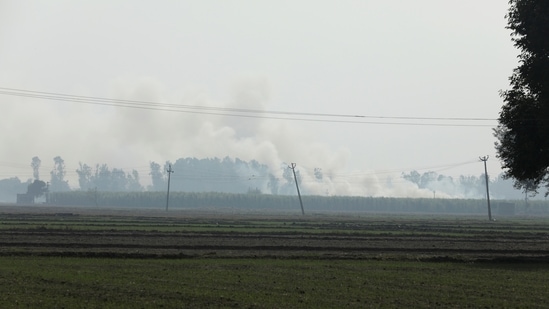Dust and smoke from farm fires in deadly cocktail
The estimates are from the Indian Institute of Tropical Meteorology’s (IITM) decision support system (DSS), which provides a forecast for Delhi’s air quality and identifies the components of the pollution, which at present includes a spike in all major sources.
The toxic smog in Delhi’s air on Friday was a hazardous amalgamation of smoke from farm fires in the nearby states of Punjab and Haryana, and Delhi’s local pollution sources such as vehicle emissions, open garbage burning and dust from construction, according to environmental experts.

The estimates are from the Indian Institute of Tropical Meteorology’s (IITM) decision support system (DSS), which provides a forecast for Delhi’s air quality and identifies the components of the pollution, which at present includes a spike in all major sources.
The analysis said that on Friday, Delhi also received pollutants from other cities such as Jhajjar, Gurugram, Baghpat, Ghaziabad and Sonepat.
“While stubble smoke remained the primary external pollution source, pollutants from other neighbouring cities also contributed to Delhi’s pollution levels. This was because Delhi shares an air shed with the entire Indo-Gangetic Plains and while measures can be taken to control the city’s local pollutants, there is still around 20-30% pollution share that comes into the Capital from other states,” said a IITM scientist, who asked not to be named.
The DSS analysis showed that on Friday, paddy stubble fires contributed to 15% of Delhi’s PM 2.5 (ultrafine particulate matter with diameter less than 2.5 micrometres), local vehicular emissions had a share of 25%, emissions from households contributed to 7% of the particulate levels and industries in Delhi and its peripheries made up 9-10% of the city’s pollution profile.
SAFAR, the Union ministry of earth sciences’ air quality monitoring station said that the stubble fires accounted to at least 35% of pollutants in the air on Friday.
Weather experts said that apart from the pollutants, a large part of Delhi’s air also had high moisture content.
“What we are seeing currently is trapping of pollutants, but along with pollutants, moisture is also being trapped and re-circulating. When moisture increases, the size of pollutants also increases and it starts expanding. Because of this sun rays are not able to reach the ground,” said Harish Madhavan, a Delhi-based independent meteorologist.
IMD scientists said that the haze in the city can be called ‘smog’, which is a toxic mix of water vapour, smoke and other pollutants.
“The visibility levels remained in the 300-800 metres range throughout the day. It is the first time this season that we have seen such poor visibility throughout the day. Even during afternoon hours, there was a thick cover of smog. Yesterday (Thursday), the smog was there, but by afternoon visibility improved to 800-1200 metres,” said RK Jenamani, senior scientist, IMD.
Experts also explained that apart from primary pollutants, which are released directly from sources, Delhi’s air also saw a toxic mix of hazardous chemicals such as sulphur dioxides and nitrogen oxides. These are formed by reaction of primary pollutants with the atmosphere. By the time pollutants from sources such as industries and biomass burning in the neighbouring states reach Delhi, they react with other pollutants or water molecules in the air to change and become more toxic.
Anumita Roychowdhury, executive director (research and advocacy), Centre for Science and Environment (CSE) said while the governments cannot change the weather conditions, during such emergency conditions, they can work towards controlling the local pollution sources.”



